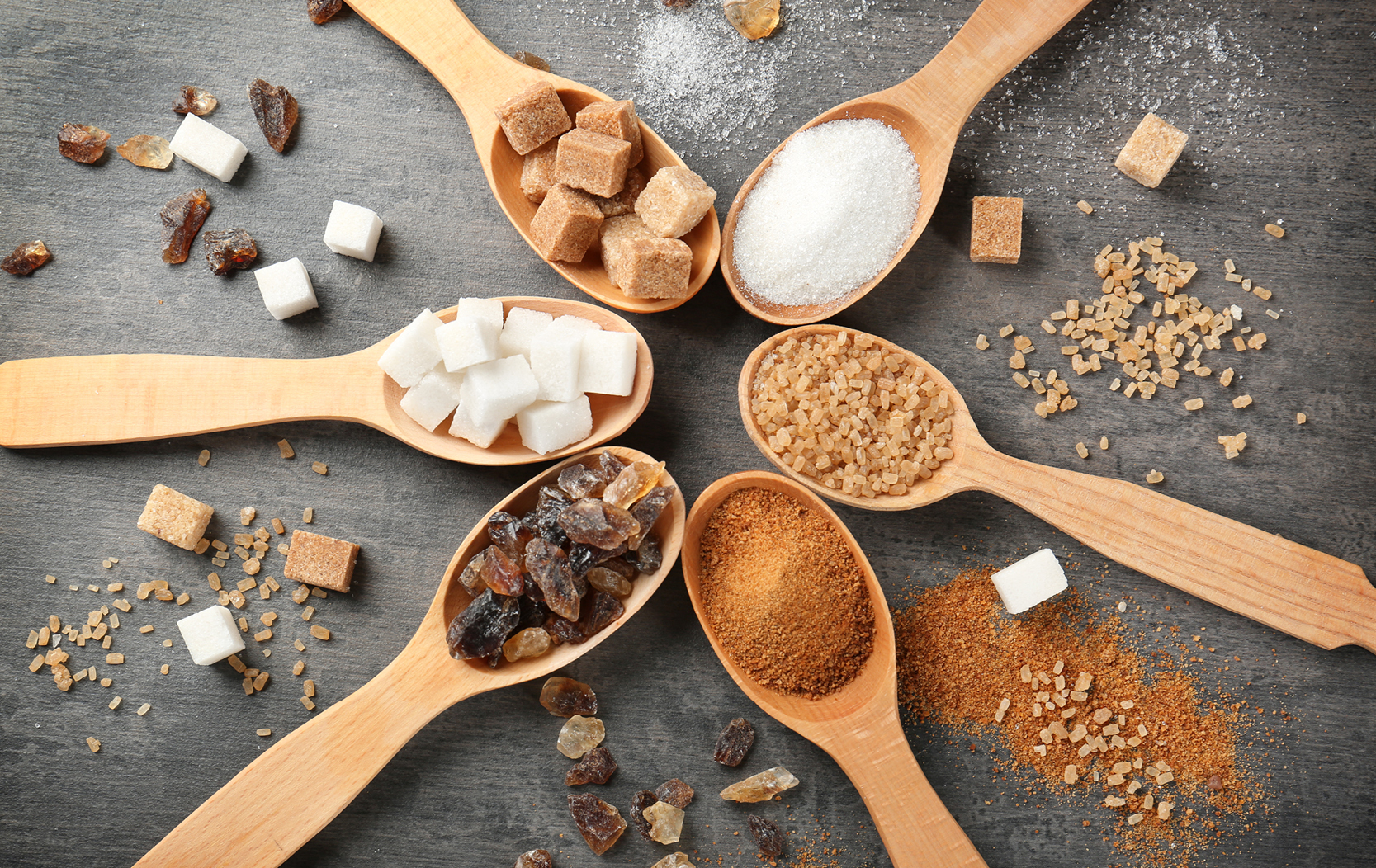Getting The Facts on Sugar
April 17, 2019,
Rebecca Haresign

With sugar being a hot topic in the media, we have put together this article to address the most frequently asked questions and to share some truth about sugar.
What are sugars?
Sugars are the building blocks that make up carbohydrates, and exist either as single sugars or multiple sugar molecules joined together. Sugar is a source of energy, and provides the body with calories.
We’re recommended to reduce a type of sugars known as ‘free sugars’, and these are the types that are commonly found as an added ingredient in products like confectionery, fizzy drinks and desserts.
Sugar is also found in foods like fruits, vegetables, dairy and wholegrains. The recommendations aren’t to reduce intakes of these types of foods as they provide a variety of other positive nutrients that are essential for the body.
As a source of carbohydrate, it’s okay to consume sugar in balanced amounts as part of a calorie-controlled diet. Our bodies do require sugars for many important processes, as glucose is a source of energy for the brain and red blood cells (1).
However, it’s always good to be mindful of the types of foods we’re consuming that are high in sugar, and how often we include them in our diets.
Why are we recommended to reduce the amount of sugars we’re consuming?
Most of us consume more sugar than we need. On average, adults in the UK consume 51g of free sugars per day, which is almost double the recommended amount (2). The main sources of free sugars in our diets are sugary drinks, biscuits, cakes, pastries, and confectionary (3). These types of foods and drinks tend to present themselves in a way where it’s easy to consume a lot of added sugar and calories in one go without any other positive nutrients like fibre, protein, vitamins or minerals – this is often referred to as ‘empty calories’.
In 2015, experts reviewed the most recent research on sugar and concluded that if we reduced the amount of free sugars we consumed each day to no more than 30g, that would help to reduce the total number of calories consumed per day. This is one part of a much bigger strategy to reduce the number of people who are overweight or obese (3).
In the UK, 66% of men and 57% of men and women respectively are overweight or obese (4). Given these high rates, reducing the populations energy intakes is likely to be beneficial to health. The researchers found that when people consumed more grams of free sugars, from foods like confectionery, fizzy drinks and desserts, the number of calories they consumed increased. By encouraging people to consume fewer of these foods and opt for healthier choices that are lower in free sugars, this is one step to help our nation become a healthy weight.
Doesn’t sugar cause you to gain weight?
As sugar is a carbohydrate and a source of calories, too much of it can contribute to weight gain. High intake of sugary foods and drinks is also associated with weight gain. However, it is a myth that sugar itself deserves all the blame for today’s obesity epidemic or that they cause weight gain irrespective of calorie content.
In 2010, the World Health Organisation (WHO) commissioned a review to answer multiple questions relating to whether consuming sugars affected weight gain (5). This research investigated whether reducing or increasing the amount of sugars people consumed influenced bodyweight. The results showed that increasing intake of sugars did increase body weight, but this was because of people consuming more calories than they need, rather than it being down to the body’s response to consuming more sugars.
The researchers also looked at whether swapping sugars with other energy providing nutrients like fat or protein, but still provided the same number of calories in total, affected bodyweight. Despite reducing the amounts of sugar in the diet, there weren’t any changes in bodyweight. This means that the number of calories we’re consuming is what determines whether we gain weight, not the amount of sugar we consume.
Why is there sugar in Isagenix products like IsaLean Shake?
In a meal replacement product such as IsaLean Shake, the total amount of sugar is around 11 grams with about half of that present as fructose, depending on the flavour. The amount is equivalent to that of a medium-sized apple which also has around half of its natural sugar content as fructose.
When used in calorie-controlled meal replacements, fructose is a preferred ingredient because it’s relatively sweeter than other types of sugar or carbohydrate sources, which allows for less use of sugar overall.
Moreover, when fructose is present in moderate amounts as part of a meal, it can deliver measurable benefits. The most recent evidence comes from Australian and New Zealand researchers who performed a meta-analysis of randomized controlled trials to evaluate the effect of fructose when used in place of other carbohydrate sources like glucose or sucrose (6). The scientists found that fructose has a much lower effect on blood glucose and insulin response.
Should I be concerned about the sugar in Isagenix products?
There’s really no reason to be afraid of sugar in Isagenix products because it’s used in balanced amounts that are strategic and smart.
Most Isagenix customers following an appropriate system drastically reduce their total intake of sugars. A study carried out at Skidmore College in the USA found that participants reduced their total intake of sugars by almost half after following an Isagenix system, despite the use of moderate amounts of sugar in Isagenix products including in meal replacements like IsaLean Shake (7). The amount of sugar in an IsaLean Shake is less than you’d find in many healthy, balanced meals.
You can also use Isagenix products to help swap out other common sources of large sugar amounts, such as sugary smoothies, snacks like chocolate bars, and sugary drinks, and to help to improve your diet and lifestyle.
References
- The Functions of Carbohydrates in the Body. Available at: https://www.eufic.org/en/whats-in-food/article/the-basics-carbohydrates (accessed 27th March 2019)
- National Diet and Nutrition Survey. Results from Years 7-8 (combined) of the Rolling Programme (2014/15 to 2015/16). Available at: https://assets.publishing.service.gov.uk/government/uploads/system/uploads/attachment_data/file/699241/NDNS_results_years_7_and_8.pdf (accessed 28th March 2019)
- Public Health England. Why 5%? Available at: https://assets.publishing.service.gov.uk/government/uploads/system/uploads/attachment_data/file/769482/Why_5__-_The_Science_Behind_SACN.pdf (accessed 27th March 2019)
- Parliament UK. Obesity Statistics. Available at: https://researchbriefings.files.parliament.uk/documents/SN03336/SN03336.pdf (accessed 27th March 2019)
- Te Morenga, L., Mallard, S. & Mann, J. Dietary sugars and body weight: systematic review and meta-analyses of randomised controlled trials and cohort studies. BMJ. 2013
- Tappy L, KA L. Metabolic effects of fructose and the worldwide increase in obesity. Physiol Rev. 2010 Jan;90(1):23-46.
- Arciero PJ, Edmonds R, He F, Ward E, Gumpricht E, Mohr A, Ormsbee MJ, Astrup A. Protein-pacing caloric-restriction enhances body composition similarly in obese men and women during weight Loss and sustains efficacy during long-term weight maintenance.Nutrients 2016, 8(8), 476; doi: 3390/nu8080476.




